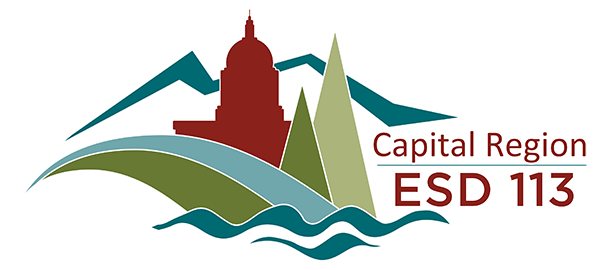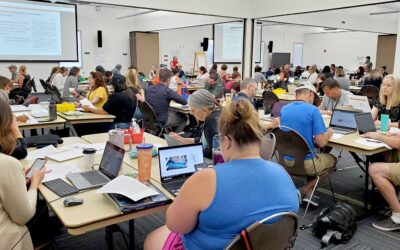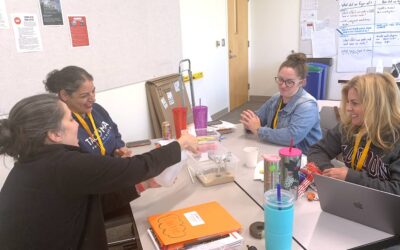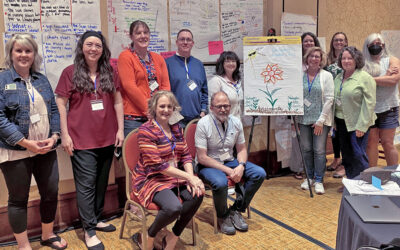ESD 113
Capital Region ESD 113 – in conjunction with their partners – will deliver high quality professional development and resources to their region’s 45 school districts focusing on Climate Science and the Next Generation Science Standards. Our statewide goal, engage teachers in authentic place-based experiences that explore ways in which climate change is impacting our unique communities.
Teacher Professional Development
To date, ESD 113 has reached 902 K–5 teachers, 361 middle school teachers, and 279 high school teachers through the following delivery methods: traditional face-to-face workshops, hybrid workshops with a mix of face-to-face and virtual meetings, and online Learning Management Systems.
Statewide – Climate Science Canvas Courses
As part of the statewide Climate Science effort, Capital Region ESD 113 took on the challenge of designing, implementing, and moderating the Climate Science Canvas Courses. This Learning Management System (LMS) provided teachers with up-to-date climate science data to analyze and protocols for conducting student-centered lessons. One unique aspect of the courses is the ability of K–12 teachers to contribute to discussion boards. Teachers can provide each other insights and helpful hints to apply what they have learned as a result of working through the courses.
One teacher said about the course, “This course allowed me to see that even my little learners can participate in respectful arguments about climate and the impact human activities have on the climate and the world around them. They learned to take turns listening to other students arguments even if they are different than theirs.”
Regional – Climate Science Series
Pacific Education Institute, NCESD GLAD Program, and EarthGen will each facilitate a grade band of teachers through a series of face-to-face meetings and ZOOM check-ins. These workshops are designed to introduce teachers to grade appropriate, locally relevant 3-D NGSS based activities that focus on climate science. Teachers will gain experience weaving the practices, disciplinary core ideas and cross cutting concepts around a local climate-based phenomenon.
Chehalis Basin Education Consortium (CBEC) will facilitate the Climate Fellows program to approximately 25 local 4th – 12th grade teachers. These quarterly meetings provide teachers with extra support from the program coordinator, additional budget for classroom and field experiences, and curriculum resources in order to effectively teach climate science in both their classrooms and outside.
Climate Science for Adjudicated Youth
CBEC organizes and facilitates 24 visits to the Thurston County and Lewis County Detention Centers. These Climate Science presentations are led by local environmental professionals and include such topics as disaster preparedness, composting, carbon footprints, salmon, and ocean acidification. Expected outcomes for the adjudicated youth: gaining understanding of local environmental phenomena and concerns resulting in increased environmental stewardship, green job awareness and critical thinking and scientific skills that will help them meet state standards.

Partners & Collaborators
AESD
Chehalis Basin Education Consortium
EarthGen
North Central ESD 171
Pacific Education Institute
Workshops
Climate Science 1.0: Engaging in Argument from Evidence for K-12 Teachers
Learn strategies and tools to support a shift in teacher-centered discussions towards a student-centered whole-class discourse. We will explore one of the Next Generation Science Standards’ (NGSS) Science and Engineering Practice of Engaging in Argument from Evidence. This practice can be done in any grade level and with any content focus. For our purposes we will choose climate science as a vehicle for conducting a student-centered whole-class discourse. Strategies for in-class and remote learning are provided.
Climate Science 2.0: Analyzing and Interpreting Data for K-12 Teachers
Learn a protocol for organizing and interpreting data through tabulating, graphing, and statistical analysis. In this context of the course, the protocol will be applied to a climate science topic. With regard to NGSS alignment, the course focuses on the practice “Analyzing and Interpreting Data” within the dimension “Science and Engineering Practices.”
Climate Science 3.0: Modeling and Student Explanations for K-12 Teachers
In this FREE online asynchronous Canvas Course, attendees will learn a protocol for developing and using models as a means for students to explain their thinking and understanding of scientific concepts. In this context of the course, the protocol will be applied to a climate science topic. With regard to NGSS alignment, the course focuses on the practice “Developing and Using Models”, as well as “Constructing Explanations” within the dimension “Science and Engineering Practices.”
Climate Science 4.0: Supporting Student Thinking through the Crosscutting Concepts for K-12 Teachers
In this FREE Canvas Course, participants will learn strategies for the practical application of the seven Crosscutting Concepts to improve student sense-making with scientific concepts. In the context of this course, the strategies will be applied to a climate science topic. The design for this course was based on feedback from Washington State’s nine Regional Science Coordinators and Science Fellows.
Climate Science 5.0: Climate Science 5.0: Supporting Student Thinking through Anchoring Phenomenon for K-12 Teachers
In this FREE online asynchronous Canvas Course, attendees will learn a protocol for developing and using Anchoring Phenomenon as a means for students to explain their thinking and understanding of scientific concepts. In this context of the course, the protocol will be applied to a climate science topic. The design for this course was based on feedback from Washington State’s nine Regional Science Coordinators and Science Fellows.
STEM Canvas Course: Crafting 3D Formative Assessment Items
Build your 3D assessment design capacity by following a step-by-step process using supporting tools to design formative assessment items—before piloting them in their classrooms. The approaches learned in this course can be used with any science curricula, at any grade level, and across all domains of science and engineering. The design for this course was adapted from the Advancing Coherent and Equitable Systems of Science Education: Resource D developed by Phil Bell and Deb Morrison.
Success Stories from ESD 113
OpenSciEd High School Summer Institute inspires and motivates teachers
“We need to stop thinking, ‘Is this student good enough for my science class?’ and start asking, ‘Is my science class good enough to engage all students?’” This was the question posed by Jamie Yoos, a chemistry teacher and OpenSciEd facilitator from Bellingham,...
OpenSciEd Elementary Field Test Launch Summer 2023
The OpenSciEd Elementary Field Test launched this August on the beautiful Washington State University, Vancouver campus. Over seventy elementary teachers from across the state participated in this three-day project launch learning about the high-quality OpenSciEd...
Washington State Team Attends OpenSciEd Facilitator Academy to Launch Elementary Field Test
A team of 12 Washington state educators—OSPI, Regional Science Coordinators, and teacher leaders—attended the OpenSciEd Elementary Facilitator Academy in Denver, CO, June 19-24 with support from the Climetime project and Williams Foundation. This week-long immersion...




